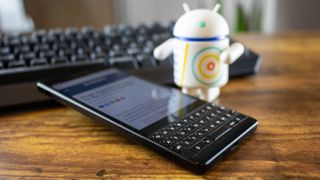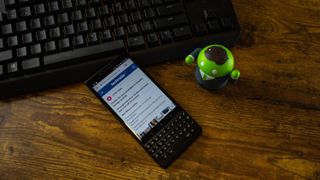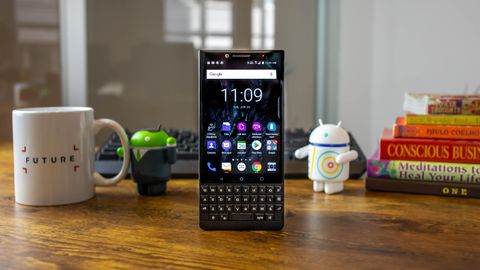Why you can trust TechRadar
Android 8.1 and BlackBerry apps
Key2’s software is one-part BlackBerry, one-part Android. It offers access to business-centered apps like BlackBerry Hub, BlackBerry Messenger (BBM), and DTEK security, while maintaining the compatibility of Google Play Store apps and a familiar interface.
It’s a combination that works without too many app redundancies. BlackBerry Hub is an all-encompassing messaging with deep customization rules, and BBM features Time and Retract tools (Snapchat for grown ups). We’re still waiting for a desktop companion app for BBM, or Google Chat to completely take over our lives.

DTEK powers BlackBerry’s security app and constantly monitors what goes in and out of your phone. For you, everything boils down to a status level and gives you a handy security rating. You can also easily review permissions of every app to understand the information they can access, and keep track of vulnerabilities.
BlackBerry Key2 and Google's own software still give us dueling email and calendar apps, but everything else about this Android software suite compliments rather than competes. That's especially true of BlackBerry Hub for its ability to streamline all of our many messages and their notifications, making for better work-life balance.
Specs and performance
The BlackBerry Key2 is fast enough for most work tasks thanks to its Qualcomm Snapdragon 660 chipset and 6GB of RAM. There are options for 64GB and 128GB of internal storage, and you can always expand upon that (up to 256GB) thanks to the microSD card slot.
It’s a serious upgrade over the KeyOne’s RAM at 3GB (initially) and 4GB (Black Edition) options a year ago. Key2 is now better at multitasking, though its curtailed screen length isn’t ideal for it. And we still saw from performance drag from gaming – this is still not a multimedia powerhouse like a new iPhone or Samsung handset.

We found similar results from stress-testing the phone with the GeekBench app and judging its multi-core scores. At its peak, we were averaging 5,572. However, running the chipset a few times in a row took us down to a score of 4,903 and two more times down to 2,779. That’s where we saw the drag in performance.
It’s not enough for the average BlackBerry user tapping away on the chiclet-style keys to take notice. But you should also be fully aware that the performance here won’t blow you away or get any better two or three years from now if you plan to hang onto the Key2 for a while.
Current page: What it's like to use
Prev Page Introduction, keyboard and design Next Page Camera and battery life

